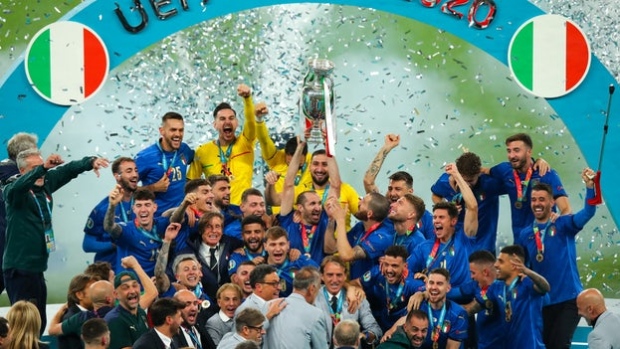Nov 26, 2021
FIFA says opponents of 2-year World Cup fear losing top spot
Opponents of FIFA’s push for World Cups every two years seem scared of being toppled from the top of world soccer, its president Gianni Infantino said on Friday.
The Canadian Press

GENEVA (AP) — Opponents of the plan for biennial World Cups seem scared of being toppled from the top of world soccer, FIFA president Gianni Infantino said Friday.
Infantino’s speech to African soccer leaders was a clear criticism of the European and South American countries which have dominated every World Cup and are threatening a boycott of biennial men’s tournaments.
“Those who are against are those who are at the top,” Infantino told officials in Cairo at a meeting of the Confederation of African Football.
“It happens in every sector of life, when there are reforms and changes, those who are at the top don’t want anything to change,” said Infantino, who was a long-time senior official at UEFA until being elected FIFA president in 2016. “They are afraid, maybe, that if something changes their leadership position is at risk.”
Europe and South America have provided every team to play in all 21 World Cup finals since the inaugural tournament in 1930, and their historical strength has earned them at least 18 of the 32 entries at next year's World Cup in Qatar.
“We understand that and we compliment and applaud them for having been so successful in reaching the top,” Infantino said. “This is fantastic and they are an example for everyone. But at the same time we cannot close the door (to others).”
UEFA declined to comment on the speech.
Infantino has pushed for biennial World Cups to help other regions develop and close the gap on the traditional powerhouse teams by giving nations more chances to qualify and players more chances to perform on the biggest stage.
No African team has reached the men’s World Cup semifinals and the continent has only five of the 32 entries. That will rise to at least nine when the 48-team tournament debuts in 2026.
An extra men’s World Cup in a four-year cycle would likely add about $3 billion at current levels to FIFA income and increase funding to its 211 member federations and six continental bodies.
“It is our responsibility to keep the dream open to give opportunities to everyone,” Infantino said.
Still, the backlash from all levels of European soccer since FIFA formally detailed its biennial plan in September led Infantino to say last month that any changes must be reached by consensus without doing harm to the game.
European and South American soccer officials see threats to the status of their own continental and domestic competitions, and an increased workload for players.
The International Olympic Committee has also opposed FIFA's plan to double the staging of its biggest tournament, saying it would "undermine the diversity and development of sports other than football.”
Infantino, who is an IOC member, hinted again Friday that a modified or new tournament could be a solution to getting wider support.
“Will it be with the World Cup or will it be in another way?” he told the 54 members of CAF, which is currently the continental body most closely aligned with FIFA. “We have to study, of course, all this.”
Annual 48-team youth tournaments, instead of the biennial World Cups for men and women at under-20 and under-17 level, are also part of FIFA’s plan to develop soccer. It was detailed in Cairo by Arsène Wenger, the former Arsenal coach who is FIFA director of global development.
Infantino warned of losing a generation of youth players whose birth year falls at the wrong time in the current cycle of tournaments.
FIFA has organized an online summit of its 211 members on Dec. 20 to discuss a strategy for future tournaments.
No vote on biennial World Cups is expected next month amid the current opposition, which includes a show of unity by UEFA and South American soccer body CONMEBOL. They have created a shared office that opens in London on Dec. 7.
___
More AP soccer: https://apnews.com/hub/soccer and https://twitter.com/AP_Sports
